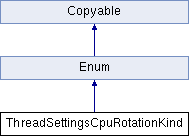Determines how com.rti.dds.infrastructure.ThreadSettings_t.cpu_list affects processor affinity for thread-related QoS policies that apply to multiple threads. More...

Static Public Attributes | |
| static final ThreadSettingsCpuRotationKind | THREAD_SETTINGS_CPU_NO_ROTATION |
| Any thread controlled by this QoS can run on any listed processor, as determined by OS scheduling. | |
| static final ThreadSettingsCpuRotationKind | THREAD_SETTINGS_CPU_RR_ROTATION |
| Threads controlled by this QoS will be assigned one processor from the list in round-robin order. | |
Additional Inherited Members | |
 Public Member Functions inherited from Enum Public Member Functions inherited from Enum | |
| final int | ordinal () |
| The integral value of this enumerated constant. | |
| Object | copy_from (Object src) |
| final String | name () |
| The name of this enum constant, as declared in the enum declaration. | |
| final String | toString () |
| The string value of this enum constant. | |
 Protected Member Functions inherited from Enum Protected Member Functions inherited from Enum | |
| Enum (String name, int ordinal) | |
| The constructor. | |
Detailed Description
Determines how com.rti.dds.infrastructure.ThreadSettings_t.cpu_list affects processor affinity for thread-related QoS policies that apply to multiple threads.
Controlling CPU Core Affinity for RTI Threads
Most thread-related QoS settings apply to a single thread (such as for the com.rti.dds.infrastructure.EventQosPolicy, com.rti.dds.infrastructure.DatabaseQosPolicy, and com.rti.dds.infrastructure.AsynchronousPublisherQosPolicy). However, the thread settings in the com.rti.dds.infrastructure.ReceiverPoolQosPolicy control every receive thread created. In this case, there are several schemes to map M threads to N processors; the rotation kind controls which scheme is used.
If com.rti.dds.infrastructure.ThreadSettings_t.cpu_list is empty, the rotation is irrelevant since no affinity adjustment will occur. Suppose instead that com.rti.dds.infrastructure.ThreadSettings_t.cpu_list = {0, 1} and that the middleware creates three receive threads: {A, B, C}. If com.rti.dds.infrastructure.ThreadSettings_t.cpu_rotation is com.rti.dds.infrastructure.ThreadSettingsCpuRotationKind.THREAD_SETTINGS_CPU_NO_ROTATION, threads A, B and C will have the same processor affinities (0-1), and the OS will control thread scheduling within this bound. It is common to denote CPU affinities as a bitmask, where set bits represent allowed processors to run on. This mask is printed in hex, so a CPU core affinity of 0-1 can be represented by the mask 0x3.
If com.rti.dds.infrastructure.ThreadSettings_t.cpu_rotation is com.rti.dds.infrastructure.ThreadSettingsCpuRotationKind.THREAD_SETTINGS_CPU_RR_ROTATION, each thread will be assigned in round-robin fashion to one of the processors in com.rti.dds.infrastructure.ThreadSettings_t.cpu_list; perhaps thread A to 0, B to 1, and C to 0. Note that the order in which internal middleware threads spawn is unspecified.
Not all of these options may be relevant for all operating systems.
Member Data Documentation
|
static |
Any thread controlled by this QoS can run on any listed processor, as determined by OS scheduling.
|
static |
Threads controlled by this QoS will be assigned one processor from the list in round-robin order.